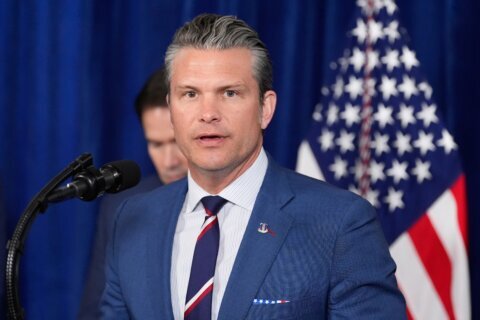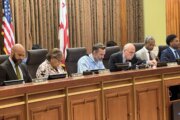This article was republished with permission from WTOP’s news partners at Maryland Matters. Sign up for Maryland Matters’ free email subscription today.
This content was republished with permission from WTOP’s news partners at Maryland Matters. Sign up for Maryland Matters’ free email subscription today.
As work continues to implement a multibillion-dollar education reform plan, some educators, public school administrators and students are meeting to offer suggestions on it.
They are organized into four advisory committees to provide expertise for the Blueprint for Maryland’s Future Accountability and Implementation Board.
Each committee met virtually Wednesday to address four particular subjects: early childhood education, high-quality and diverse teachers and leaders, college and career readiness and more resources for students to be successful.
“It is not up to us to tell you what to do. We are to listen to you,” said board chair and former Montgomery County Executive Isiah “Ike” Leggett. “It is your role to advise us to the degree we can assist you. We want you to do the work and we will help you to facilitate that; our role is a secondary one.”
Each committee is asked to make suggestions to boost, improve, or eliminate proposals laid out in charts and other documents.
A draft of the Accountability and Implementation Board’s recommendations will be released next month and a public hearing is scheduled to review that plan Nov. 10.
The board must approve a final draft of the Blueprint plan and submit it to the General Assembly and the governor by Dec. 1.
Committee members met online for formal introductions, to choose a chair and vice chair and to analyze priorities for each subject area.
But the public could only view one group Wednesday: the committee on hiring and obtaining high quality and diverse teachers.
Rachel Hise, the board’s executive director and longtime legislative policy analyst, said each committee session was recorded and scheduled to post online Thursday.
The committee on teachers selected John Seelke, an instructional specialist for secondary math in Montgomery County Public Schools, as their chair. And they selected Kristi Murphy Baldwin, chief of human resources for Prince George’s County Public Schools, as their vice chair.
Oumany Diallo, a Bowie High School student from Prince George’s, will also serve on the committee but wasn’t able to attend Wednesday.
One committee member said she is concerned that the plan does not focus on retaining teachers once they are hired.
Patricia M. Twitty, an instruction lead teacher in Prince George’s who was recruited from college to work in Queen Anne’s County, said she “knew nobody and knew nothing” when she moved from Alabama to Maryland. She suggested that the plan include providing social and emotional supports for teachers, especially for those coming in from other states.
“We do a lot of efforts to recruit people, but then we don’t really address the portion of maintaining,” she said. “Address those social [and] emotional needs of those that we recruit to the state.”
Brian King, a principal at an elementary school in Charles County, asked how the Blueprint addresses teachers with conditional certificates. According to the state Department of Education, those certificates are valid for two years for an employee who doesn’t meet all the professional requirements.
Hise admitted the plan doesn’t “delve into [that subject] as deeply.”
As a way to recruit and retain teachers in the state, part of the Blueprint’s plan proposes to increase teacher pay. It also proposes to provide additional resources such as professional development and to allow teachers to collaborate during the school day versus after school.
There isn’t a committee created for a fifth subject area labeled governance and accountability, but the board meets Thursday to review those proposed policy recommendations.







